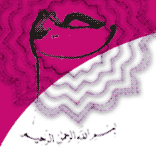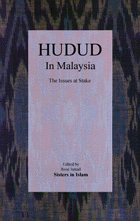
| E-mail sis@sisfora.po.my | Tel 603-2426121, 2483705 | Fax 603-2483601 | |
| About SIS | Issues & Themes | Resources | Programmes & Events | Links | Home | |
Hudud in Malaysia
|
|
Introduction to the book
Although the Kelantan Syariah Criminal Bill (II) is now an Enactment, its enforcement remains only a possibility for as long as its implementation continues to be a bone of contention between the State and Federal Government, thus offering some space for further debate on the viability of enacting the hudud. This book, therefore remains current as the voice if an alternative opinion. However, its currency does not deny it the possibility of being relevant whatever the eventual turn of events may be.
We, Sisters in Islam, the author, editor and compiler of this book, have felt the necessity to put forward an alternative standpoint regarding the above mentioned Enactment passed by the Kelantan State Government on Nov 25, 1993.
The urgency we shared was born of the understanding that should all the possibilities and the consequences not be weighed carefully, the implementation of hudud holds within it the potential for enormous injusices. Fear of this eventuality forced us to make plain, for public examination, our anxiety.
But the strength of our beliefs must lie within the many arguements - the pros and cons - informing the whole debate. The book sets out to demonstrate this by including the various positions, each held separately and independently. These are the positions help by our group (Part One); Parti Islam Se Malaysia (PAS), the originators of the Enactment (Part Two); the Prime Minister, which must reflect the position of the Federal Government as headed by him (Part Three); and, not least, Professor Ahmad Ibrahim, a respected and distinguished Islamic scholar with the International Islamic University (Part Four). We have also included in the appendices the Kelatan Syariah Criminal Code (II) Bil 1993; the paper on hudud law delivered by Professor Ahmad Ibrahim at a Pusat Islam workshop in January, 1994; and a selection of newsaper articles to reflect the range of views held by Malaysians. These are views already made public through the media which we believe require a systematic compilation enabling easy access to all those who feel the need to be informed. That it would excite the interest of all Malaysians is our deepest hope.
In our Memorandum to the Prime Minister we have enumerated our position from the legal perspective, the historico-sociological view point and a compilation of the empirical evidence of injustices as found in other Muslim countries - forerunners in the implementation of the hudud. These views were aired at a Forum on Women and the Syariah Criminal Bill (II) 1993 at the Institute of Strategic and International Studies on Nov 10, 1993. We also organised a workshop to discuss aspects of the Bill which we found prejudicial towards women. This was held in Universiti Malaya on Jan 4, 1994.
Above all, we are indebted to the overarching canopy of Divine Justice that emanates from the Qur'an. Allah's Divine Justice is always tempered with mercy and compassion. Indeed, every surah of the Holy Book (save one) is opened "In the name of Allah: the merciful, the compassionate."
While we do not dispute PAS' arguements regarding the Qur'anic origin of the hudud, we sincerely believe that such severe punishments which are undoubtedly meant to deter, are but aspects of commandments internalised by each and every Muslims. Indeed, can we not consider the cutting off of hands of thieves as metaphors of Divine Abhorrence for the heinous act of theft?
Unlike the summary justice of the Judaic tradition, the Qur'an does not speak exclusively of "a life for a life" in the event of murder. Neither does it observe only the "turning of the other cheek" from the Christian tradition. Rather the Qur'an tempers them both with an absolute emphasis on justice. Such justice cannot be achieved unless we carefully consider the underlying rationale relevant to every circumstance and temper this with compassion.
The universality of the Qur'an overrides its own specific historical context. It is our belief that humanity's inability to transcend history, a necessary consequences of having being created, demanded some guidence specific to the context of the revelation. In the light of the clarity of this literal utterances, it is no wonder that the more subtle, yet more important universal virtues have been ignored. The result is that Islam has been viewed - by Muslims and others - as a severe and punitive religion with a vengeful Lord and Creator.
Quite apart from the techno-legal difficulties, we seek to highlight the repetition in the Qur'an that "Allah does not oppress" makes it impossible to support any violation of human dignity - even towards a transgressor.
It is against this backdrop that we have to focussed our hopes for the operationalising and contextualising of the Divine Message. Indeed in our effort to do just this, we have found aspects of the Kelantan Syariah Enactment to run counter to the spirit and intent of the Qur'an. Take rape, or instance. In trying to establish this, a woman must produce four male Muslim eyewitnesses to the act without which she can be accused of adultery or fornication. Given that this is the absolute precondition for any woman to seek redress for such heinous crime, it would seem that the laws cannot protect women because rape, as we know, is never committed in the open (Parts One and Four explore this in great detail). For this reason, we are adamant that no matter how well-intentioned the Enactment appears to be, it can have adverse if not unforseen and unintended effects for Muslim women, specifically, and for society as a whole.
Consequently, while the immediate concern of this book is the Kelantan Syariah Criminal Enactment (II), we deem it appropriate, too, as we focus on this to urge Muslims to look more towards Qur'anic universals in order to comprehend fully the intention behind the specifics. Insha'Allah, we hope such endeavour would more clearly highlight the social, economic, political and spiritual rights and responsibilities, not only of Muslims, but of all humankind.
|
|
| "The hudud provisions emerged as opinions of lawyers (fuqaha or jurists in Muslim jurisprudence). Formed through a methodology of interpretation (ijtihad, qiyas), their views were given subsequent sanction through the political-legal process through ijma', or the consensus of the jurists of a particular time and place (but consensus is not unanimity), or through a majority opinion (jumhur). These processes are human efforts, not devine injunctions." (Memorandum to the PM) | |
| "An interpretation of a Qur'anic text requires a knowledge of the Qur'an, Sunna, linguistics and history. The words in any text do not exist in a vacuum, and the interpreters and jurists are human beings who are an outcome of their social and cultural circumstances, even if they are dealing with the permanent message of God." (Muslim Women in the Family & Society). | |
Copyrightę 2000 SIS Forum (Malaysia) Sdn Bhd. All rights reserved. JKR No. 851, Jalan Dewan Bahasa, 50460 Kuala Lumpur, Malaysia.
